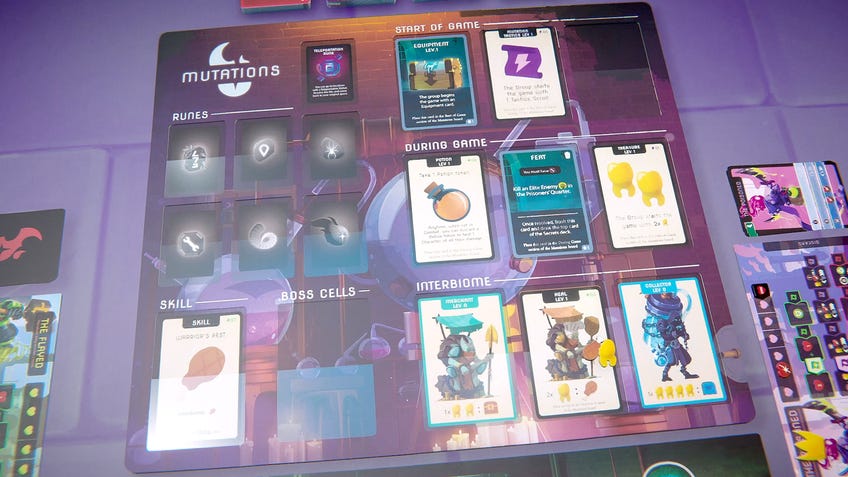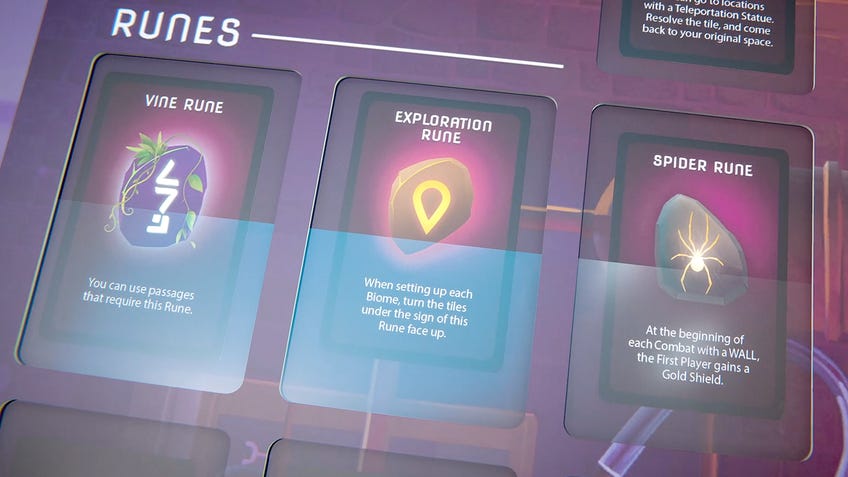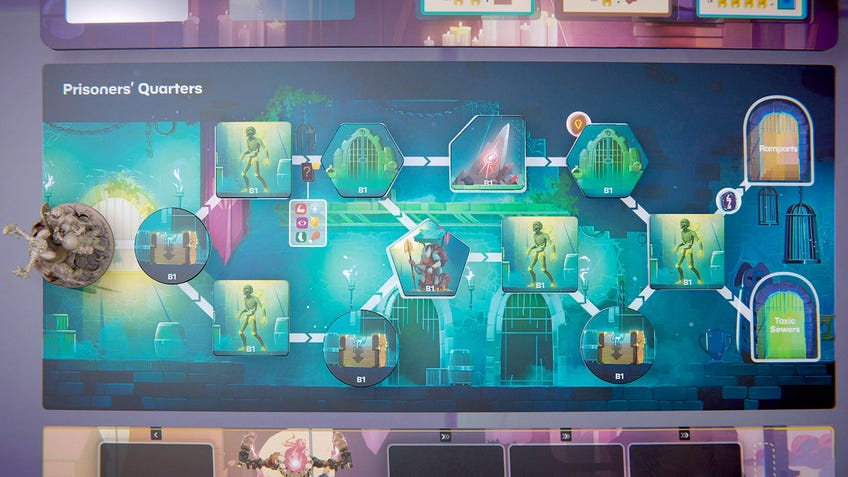Here’s how the Dead Cells board game’s roguelike and Metroidvania gameplay works
Live, die, live again.
Acclaimed video game Dead Cells is headed to the tabletop, bringing its mixture of roguelike and Metroidvania gameplay to a co-op board game - and we’ve heard from its creators how it works.
In Dead Cells, the lone player’s Prisoner fights their way out of a plague-stricken island in search of the King they intend to slay. On death, they lose all of the weapons and items they’ve collected during each run, resetting back to the place they began - a central part of the roguelike genre. However, some unlockable items, such as weapon upgrades, remain permanently acquired, allowing the player to discover them on future runs. The game’s collected currency of cells can also be used to increase the player’s health and unlock other new weapons for later runs.
Speaking with Dicebreaker ahead of Dead Cells: The Rogue-Lite Board Game’s Kickstarter launch on May 16th, Scorpion Masqué studio head Manuel Sanchez explained that the board game introduces a number of gameplay elements and changes to translate the roguelike feel to the tabletop.
Like the video game, the Dead Cells board game takes place across multiple individual runs - except now there’s the option to play as a group, rather than just as a single player.
As in the video game, the players will collect improvements as they make their way through two biomes’ series of branching routes before facing a boss. These improvements include scrolls that boost their character’s stats, gold used to purchase items from merchants and new equipment, added to each player’s character board.
“We had to let go of the idea that one run could let you go all the way to the final bosses through a series of biomes and lesser bosses - runs were too long and it was discouraging to die and start over,” Sanchez said of the board game’s more approachable standalone 45-minute runs. “That’s why a successful run is now two biomes and one boss, with a different biome’s ‘cluster’ for each boss. We want to encourage players to play several runs in one play session.”

If a character hits zero health, the run ends for the whole group and their progression through the game’s biomes is reset. This also drops any obtained equipment and resets scroll upgrades, but can see collected blueprints added to the equipment deck for future runs.
Players do, however, keep their collected cells. These can be used to buy permanent mutations - which add new effects to any future runs, such as additional merchants and potions - improved combat cards for individual characters and other cards with specific instructions.
As well as mutations and blueprints, other elements will persist between runs and play sessions in the Dead Cells board game - giving it a light legacy game feel. Discovered rune cards can unlock other permanent effects for future runs, as well as opening the way to new biomes. Players will also be able to customise their character’s unique deck of combat cards with unlocked abilities, allowing them to try different loadouts during each run and improve their odds in the board game’s card-driven combat encounters.

Upgrades aren’t tied to a specific character, with the ability to openly swap combat cards between all of the players’ chosen Beheaded - there will be four in the core box - before each run. While some cards and abilities will carry across between sessions, the roguelike resetting of progression means that there’s no need to play with the same group each time - or with a group at all, as the board game includes a solo mode.
“At one stage the designer team managed to emulate the video game and to seamlessly inject all the evolutive content during a run, instead of at the end of the run; you bought combat cards and mutations during interbiomes and blueprints were added to the loot pile during biomes,” Sanchez said of the changes from the video game. “This system was very ingenious and blended perfectly with the rest of the gameplay... but in the end it was so seamless that players had no sensation of permanent progression. They used the permanent upgrades at the moment they discovered them and they missed the kick to have to have to start over a new game to benefit from them.
“We had to reverse to a more classic phase of evolution in-between the runs to bring back the pleasantly addictive sensation to be eager for the next game.”

The board game’s roguelike progression combines with its translation of the Metroidvania genre’s exploration and traversal elements. As players revisit each biome, they will be able to explore new paths inaccessible on previous runs, eventually discovering completely new areas.
Each biome will feature a number of branching paths for players to venture along, encountering other choices to make on the way - from which route to take to whether to swap their equipment out or opt for cells over gold. The group can choose to take on harder Elite enemies to earn better treasure, or play it safer to potentially delve deeper into the dungeon.
“Metroidvanias and side-scrolling rogue-lites like Dead Cells are not so much about platforming and much more about exploration and combat, and these two last categories can be done in a board game,” Sanchez said.
“For the exploration we kept the [video game’s] side view by avoiding representing top-view rooms on the tiles. Instead, you see a door, a chest or an enemy on one side and pictograms on the other side to represent the room content. Furthermore, we kept side progression to the biome’s overall ‘map’ to stick to the original game exploration feeling.”
Dead Cells: The Rogue-Lite Board Game will hit Kickstarter on May 16th.

